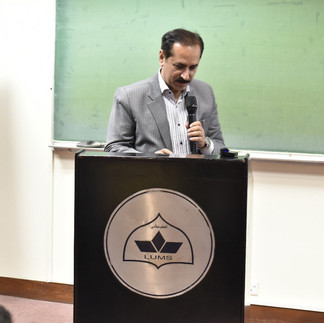Postcolonial Perspectives in Urdu Literature
- asadullah3
- Oct 14, 2025
- 4 min read
Friday, 10 October, 2025 | 6:00 - 8:00 PM | A-11 Auditorium, Academic Block, LUMS

The Gurmani Centre for Languages and Literature, LUMS, hosted the launch of Postcolonial Perspectives in Urdu Literature, the English translation of مابعد نوآبادیات: اردو کے تناظر میں by Dr. Nasir Abbas Nayyar. The discussion featured Dr. Najeeba Arif, Dr. Rauf Parekh, and Dr. Omair Ahmad Khan, the translator of the book, who engaged in a stimulating exchange on language, translation, and the intellectual significance of postcolonial thought in Urdu literary studies.
Opening the conversation, Dr. Omair Ahmad Khan shared his reflections and personal experience of translating the work. He noted that through this translation, Urdu is finally talking back to its colonizer, a gesture that reopens the dialogue between the colonizer and the colonized. He observed that postcolonial studies reassess these two entities and that global academic discourse around Urdu remains limited, particularly in Europe. In this way, the translation becomes not only a linguistic exercise but an intellectual intervention—an attempt to situate Urdu within broader conversations on power, history, and decolonization. Dr. Khan also reflected on the relationship between translation and identity, noting that to translate such a text is to participate in an act of reclaiming narrative and critical space for the Urdu language within global academia.
Following him, Dr. Najeeba Arif read a reflective essay in Urdu that placed Postcolonial Perspectives in Urdu Literature within the wider historical and philosophical context of postcolonial thought. She congratulated Dr. Nasir Abbas Nayyar and Dr. Omair Ahmad Khan for making accessible to an English-speaking audience a work that redefines how Urdu literature can be studied through the lens of postcolonial theory. Dr. Arif described the book as not merely a theoretical engagement but a historical and cultural study of how colonialism reshaped languages, sensibilities, and literary imagination in the subcontinent. She emphasized that colonialism was not only a political or economic experience but a spiritual and linguistic rupture that disrupted selfhood, confidence, and creativity among the colonized. By obstructing the natural evolution of indigenous societies, she noted, colonial power left behind deep psychological and cultural scars that continue to shape our intellectual life.
Drawing on Dr. Nayyar’s engagement with theorists such as Edward Said, Homi K. Bhabha, and Albert Memmi, Dr. Arif highlighted that the book allows Urdu readers to recognize postcolonial thought as a product of their own historical condition rather than a borrowed Western framework. She praised the translation’s clarity and sensitivity, observing that Dr. Khan had managed to preserve the conceptual density and creative texture of the Urdu original while enabling it to speak to new audiences. She concluded by asserting that the book revives an important conversation in Urdu criticism—one that connects language, literature, and history to the larger question of intellectual decolonization.
Dr. Rauf Parekh then shared his reflections on the book, recalling that when مابعد نوآبادیات: اردو کے تناظر میں was first published in 2013, postcolonial discourse in Urdu literary criticism was still in its early stages. He remarked that reading the book at that time made him aware of the depth of intellectual neglect that had persisted in Urdu studies—an unawareness, as he put it, “of not knowing what we do not know.” He praised Dr. Nayyar for introducing to Urdu criticism a theoretical framework that compels readers to re-examine the assumptions inherited from colonial modernity and the intellectual hierarchies it produced.
Dr. Parekh went on to critically examine Orientalist discourse, discussing how Western scholars often distorted or selectively interpreted Eastern texts to fit their own ideological paradigms. He cited examples such as William Jones, who, despite his linguistic expertise, viewed Eastern literary and philosophical
traditions through a colonial lens that privileged European rationality, and William Dalrymple, whose popular historical narratives, while sympathetic, still reproduce a sentimentalized and aestheticized image of the East. These examples, Dr. Parekh argued, reveal how translation and interpretation have historically functioned as instruments of power. He commended Postcolonial Perspectives in Urdu Literature for exposing these misrepresentations and for reclaiming interpretive agency for Urdu and its readers. In doing so, the book not only critiques the epistemic violence of Orientalism but also offers a framework for reconstructing Urdu’s literary and intellectual history on decolonized terms.
In his concluding remarks, Dr. Nasir Abbas Nayyar expressed gratitude to the speakers and reflected on the intellectual journey of the book—from its conception in Urdu to its English translation. He shared how writing مابعد نوآبادیات: اردو کے تناظر میں opened for him new avenues of thought, prompting further explorations into the politics of knowledge, language, and representation in South Asian literary cultures. He noted that the book’s engagement with postcolonial theory has continued to evolve, leading him toward newer questions about translation, identity, and the place of Urdu in global academic discourse. Dr. Nayyar emphasized that the ongoing dialogue around postcolonial perspectives in Urdu is not static but a living, expanding field that connects creative, historical, and critical sensibilities across languages.
The discussion concluded with an engaging question-and-answer session, in which students and audience members reflected on the contemporary relevance of postcolonial theory in understanding linguistic hierarchies, cultural identity, and literary production in Pakistan.













